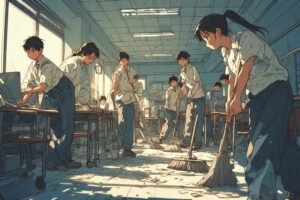
Why Janitor-san Is Not a Hero
The Quiet Work of Janitor-san
Janitors, often called “janitor-san” in anime or manga-inspired contexts, are the backbone of any functional space. They sweep floors, empty trash, and clean messes most people avoid. But janitor-san is not a hero in the way we imagine heroes—those with dramatic rescues or grand gestures. Their work is repetitive, physically demanding, and often unnoticed. In schools, janitors ensure classrooms are spotless for students to learn. In offices, they create environments where people can focus. Yet, their efforts rarely earn applause. This lack of recognition doesn’t diminish their value; it highlights a societal bias toward glorifying only visible, flashy contributions. Janitor-san’s role is essential, but it’s not celebrated like a superhero’s. Their quiet dedication keeps spaces livable, proving that not all vital work needs a spotlight to matter.
Society’s View on Heroes
Society loves heroes who stand out—think firefighters saving lives or doctors curing patients. Janitor-san is not a hero in this lens because their work lacks drama. Heroes are often defined by moments of crisis, like saving someone from danger. Janitors, however, prevent crises by maintaining hygiene and safety daily. Their work stops problems before they start, like preventing illness through clean facilities. This proactive role doesn’t grab headlines, so society overlooks it. In pop culture, especially in anime, janitors are sometimes shown as background characters, not protagonists. This reflects a broader mindset: we value what’s loud and visible over what’s steady and subtle. Janitor-san’s contributions are vital, but they don’t fit the heroic mold society celebrates, which often ignores the quiet strength of everyday workers.
The Cultural Lens of “Janitor-san”
The term “janitor-san” comes from Japanese honorifics, often used in anime or manga to give respect to roles like teachers or workers. But even in these stories, janitor-san is not a hero. They’re often minor characters, cleaning up after the main cast’s adventures. This mirrors real-world perceptions where janitors are seen as supporting roles, not stars. In Japan, cleanliness is a cultural value, yet janitors don’t get the same respect as other professions. Globally, this pattern holds—janitors are essential but undervalued. Their work ensures schools and offices run smoothly, but it’s rarely celebrated. By calling them “janitor-san,” we acknowledge their role politely, but it doesn’t elevate them to heroic status. This cultural lens shows how we respect the work but stop short of glorifying it.
The Physical and Emotional Toll
Janitor-san is not a hero, but their work is far from easy. Cleaning requires physical stamina—lifting heavy trash, scrubbing floors, and handling chemicals. It’s repetitive and can lead to injuries like back pain or fatigue. Emotionally, janitors often feel invisible. Students might ignore them, and coworkers rarely thank them. This lack of appreciation can weigh heavily, yet janitors keep going. Their resilience is admirable, but it’s not the kind of strength we associate with heroes. Heroes get cheers; janitors get silence. Still, their persistence ensures our spaces are safe and clean. This unseen effort deserves recognition, even if it doesn’t come with a cape or a dramatic soundtrack. Janitor-san’s quiet endurance is a different kind of strength, one that supports society without seeking glory.
Why Recognition Matters
Janitor-san is not a hero because society rarely acknowledges their work. Recognition shapes how we view roles. Doctors and teachers get praise because their impact is visible—saving lives or shaping minds. Janitors’ impact is less obvious but just as critical. Clean schools prevent illness; tidy offices boost productivity. Without janitors, these spaces would crumble. Yet, they’re often paid less and valued less. Recognizing their work could shift perceptions, showing that every role matters. Small gestures—like thanking a janitor or noticing their efforts—can make a difference. Janitor-san may not seek hero status, but acknowledging their contributions highlights their worth. It’s not about capes or medals; it’s about valuing the people who keep our world running smoothly every day.
Redefining What Makes a Hero
The phrase “janitor-san is not a hero” challenges us to rethink heroism. Traditional heroes are bold, visible, and celebrated. Janitors are none of these, yet their work is indispensable. Maybe heroism isn’t just about dramatic acts but about consistency and care. Janitor-san shows up daily, ensuring our spaces are safe and functional. This quiet dedication might not make headlines, but it’s heroic in its own way. By redefining heroism, we can value roles like janitors more. They don’t need to be superheroes to matter. Their steady, unseen work supports society in ways we often take for granted. Janitor-san is not a hero by society’s standards, but their contributions suggest we need a broader view of what heroism means.
The Economic Reality of Janitorial Work
Janitor-san is not a hero, and their paycheck reflects this. Janitors often earn low wages despite their essential role. In the U.S., the median annual wage for janitors is around $30,000, far less than professions like teaching or nursing. This gap shows how society values visible contributions over subtle ones. Janitors work long hours, often at night, with few benefits. Yet, their work keeps schools and workplaces functional. Low pay doesn’t mean low value; it reflects a system that overlooks quiet contributors. Janitor-san’s economic reality highlights a flaw in how we reward essential work. Recognizing their worth could lead to better wages and respect, even if they’re not seen as heroes. Their role deserves fair compensation for keeping our spaces safe and clean.
The Unsung Impact on Communities
Janitor-san is not a hero, but their impact on communities is profound. Clean schools help students focus and stay healthy. Spotless offices improve worker morale and productivity. Janitors prevent the spread of germs, especially during flu seasons or pandemics. Their work creates ripple effects—students learn better, employees perform better, and public spaces feel welcoming. Yet, this impact is rarely celebrated. Janitor-san’s role is like the foundation of a building: invisible but critical. Without them, communities would struggle to function. Their unsung efforts show that you don’t need to be a hero to make a difference. By keeping spaces clean and safe, janitors support everyone, proving their quiet work has a lasting, meaningful impact on society.
The Role of Janitors in Schools
In schools, janitor-san is not a hero, but they’re vital to education. They clean classrooms, hallways, and bathrooms, creating a safe environment for learning. A dirty school can distract students or spread illness, hurting attendance and performance. Janitors work before and after school hours, often unnoticed by students and teachers. Their efforts ensure desks are clean, floors are safe, and facilities are usable. Without them, schools couldn’t function. Yet, students rarely thank them, and their work is seen as routine, not heroic. Janitor-san’s role in schools shows how essential workers can be overlooked. Their daily efforts support education in ways that deserve more appreciation, even if they don’t fit the dramatic image of a hero.
Comparing Janitors to Traditional Heroes
Janitor-san is not a hero like firefighters or doctors, and the comparison reveals why. Firefighters save lives in emergencies; doctors heal the sick. Their actions are immediate and visible, earning public praise. Janitors, however, prevent problems through daily maintenance. Their work is proactive, not reactive, so it’s less noticed. A firefighter’s rescue makes news; a janitor’s clean floor doesn’t. Both are essential, but only one gets called heroic. This difference highlights society’s focus on dramatic acts over steady contributions. Janitor-san’s role is less glamorous but no less important. They keep spaces functional, supporting everyone who uses them. Comparing them to traditional heroes shows how we undervalue quiet, consistent work that’s vital to our daily lives.
How Janitors Shape Work Environments
Janitor-san is not a hero, but they shape workplaces in powerful ways. A clean office boosts employee morale and productivity. Cluttered or dirty spaces can stress workers and lower focus. Janitors ensure desks are tidy, floors are clean, and common areas are welcoming. Their work creates an environment where people can thrive. During pandemics, their role became even more critical, disinfecting surfaces to keep workers safe. Yet, their efforts are rarely acknowledged. Janitor-san’s impact on workplaces shows that small, consistent actions matter. They may not be celebrated like heroes, but their work makes a difference every day. By maintaining clean, safe spaces, janitors support the success of every workplace, quietly shaping how we work.
The Future of Janitorial Work
Janitor-san is not a hero, but their role is evolving. Technology, like cleaning robots, is changing janitorial work, handling repetitive tasks like vacuuming. Yet, human janitors remain essential for detailed cleaning and problem-solving. As workplaces prioritize hygiene post-pandemic, demand for skilled janitors is growing. However, their pay and recognition lag behind. The future could bring better training and wages if society values their work more. Janitor-san’s role may not become heroic, but it could gain respect as people see its importance. Investing in their skills and tools could elevate their status, even if they don’t wear capes. The future of janitorial work depends on society recognizing that janitor-san’s quiet contributions are vital to our daily lives.
Why is janitor-san not considered a hero?
Janitor-san is not a hero because their work lacks the dramatic, visible impact society associates with heroism. Heroes are often celebrated for bold, crisis-driven actions, while janitors perform steady, preventive tasks like cleaning, which go unnoticed but are essential.
What does the term “janitor-san” mean?
“Janitor-san” comes from Japanese honorifics, often used in anime or manga to respectfully address someone in a role, like a janitor. It reflects a cultural nod to their work but doesn’t elevate them to heroic status.
How do janitors impact schools and workplaces?
Janitors create clean, safe environments that support learning and productivity. In schools, they ensure hygienic spaces for students. In workplaces, they boost morale and focus by maintaining tidy, welcoming areas.
Why don’t janitors get more recognition?
Janitors’ work is often invisible, done before or after regular hours. Society tends to value dramatic, visible contributions over quiet, consistent ones, leading to less recognition for janitors despite their essential role.
Can janitors ever be seen as heroes?
Redefining heroism to include consistent, unsung contributions could allow janitors to be seen as heroes. While they may not fit traditional hero molds, their daily efforts to keep spaces safe and functional deserve more appreciation.
Conclusion
Janitor-san is not a hero in the way society defines heroes, but their work is far from ordinary. They keep our schools, offices, and communities clean and safe, supporting everyone’s daily lives. Their quiet dedication, resilience, and unseen impact challenge us to rethink what makes someone heroic. By valuing their contributions, we can shift how we view essential workers. Janitor-san may not wear a cape, but their steady efforts make them vital to society. Let’s appreciate the unsung roles that keep our world running and consider that heroism might lie in the everyday acts we often overlook.






